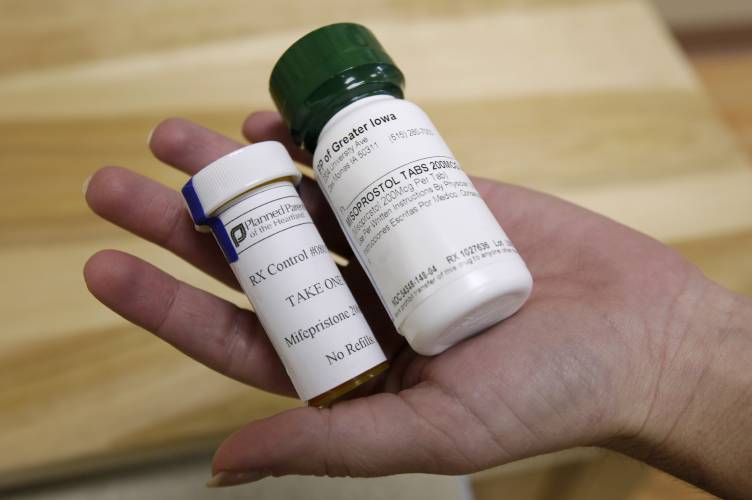Opinion: Time to reaffirm NH’s long-standing support for reproductive rights

Bottles of abortion pills mifepristone, left, and misoprostol, right. Charlie Neibergall / AP
| Published: 02-13-2024 6:00 AM |
State Rep. Alexis Simpson of Exeter is Deputy House Democratic Leader.
As we approach spring, the looming challenge to the Food and Drug Administration’s approval of mifepristone at the U.S. Supreme Court casts a shadow over abortion access in New Hampshire. This case, which will be heard in late March, could have immediate and profound implications for abortion access in New Hampshire and across the nation.
Mifepristone, the first of two drugs used in medication abortion and available up until the 11th week of pregnancy, secured FDA approval over two decades ago. Since then, it has been used by more than five million people in the U.S. to safely end their pregnancies and is used in over half of all abortions in the United States.
That number is even higher in Northern New England where, according to Planned Parenthood of Northern New England, about 70% of their abortion patients choose medication abortion. Medication abortion has been an essential option for Granite Staters allowing patients to make their private medical decisions on their own terms. Now, this access is at grave risk.
I’m calling on my colleagues in the New Hampshire State House to stand up for access to medication abortion and pass HCR 11, a resolution that condemns medically unnecessary restrictions on medication abortion, without delay. Here’s why.
First, New Hampshire has a long tradition of supporting the right to privacy in medical decisions and abortion access that extends to today. In 1991 New Hampshire led the nation and became the first state to pass a resolution recognizing the importance of mifepristone access and urging the FDA to begin clinical trials.
Granite Staters remain staunch supporters of abortion rights. A recent survey from Breakthrough Campaigns found that a supermajority of Granite Staters, 87%, support reproductive freedom. This support for reproductive rights in New Hampshire transcends party lines. New Hampshire presidential primary exit polling found that 54 percent of New Hampshire Republicans believe that abortion should be legal and accessible in all or most cases.
Second, New Hampshire should never be in the position where judges in Texas are deciding what safe and effective FDA-approved medicines Granite Staters should be able to access. Disappointingly, while other New England governors have rallied behind an amicus brief supporting this critical medication, the Sununu administration has refused to act, and has remained silent on this national abortion litigation that will have direct and significant impacts on Granite Staters’ ability to access abortion early in pregnancy.
Article continues after...
Yesterday's Most Read Articles
 New Concord apartments open in former First Congregational Church
New Concord apartments open in former First Congregational Church
 Inside EFAs: How school vouchers have fueled an enrollment boom at Christian schools across New Hampshire
Inside EFAs: How school vouchers have fueled an enrollment boom at Christian schools across New Hampshire
 St. Paul’s School won’t reopen public access to Turkey Pond
St. Paul’s School won’t reopen public access to Turkey Pond
 ‘Bittersweet’: The Post on Main Street closes Friday
‘Bittersweet’: The Post on Main Street closes Friday
 Goodwell Foods takes over Rustic Crust private label frozen pizza
Goodwell Foods takes over Rustic Crust private label frozen pizza
 Messy parking around Concord’s bus terminal won’t get less messy any time soon
Messy parking around Concord’s bus terminal won’t get less messy any time soon
Now, HCR 11 represents the only remaining concrete step for New Hampshire to take to reaffirm its commitment to medication abortion access. By doing nothing, New Hampshire is effectively ceding control over our medical decisions to a judge in Texas.
Finally, the ramifications of this case extend far beyond abortion care. This case could potentially stifle medical innovation and jeopardize the nation’s science-based drug approval process. A ban on mifepristone could unravel the entire drug approval system, casting a shadow of uncertainty over all approved medications and subjecting them to partisan ideology.
The politicization of medical decisions sets a dangerous precedent, and will without a doubt erode public trust in the integrity of drug regulation and will jeopardize patients’ health and safety. Other drugs like mifepristone, which is also used for miscarriage management, care for uterine fibroids, and ectopic pregnancies, could get caught up in political crosshairs. We cannot afford to allow ideological agendas to dictate medical practice or what medicines are available in our state or country.
Patients deserve unfettered access to the medication they need, free from unnecessary interference from judges or politicians. Healthcare providers must be empowered to offer essential medical care without fear of arbitrary or political restrictions. Passing HCR 11 is not a symbolic gesture; it’s a concrete step that New Hampshire can and should take to demonstrate our state’s and our people’s commitment to reproductive rights and health care autonomy.
By passing HCR 11, we can reaffirm New Hampshire’s long-standing support for reproductive rights, privacy in medical decisions, and the fundamental civil rights of its citizens.







 Opinion: Our leaders’ puzzling decision to eliminate the State Council on the Arts
Opinion: Our leaders’ puzzling decision to eliminate the State Council on the Arts Opinion: How dark can it get?
Opinion: How dark can it get? Opinion: Unfair taxes, unfair schools: The New Hampshire way
Opinion: Unfair taxes, unfair schools: The New Hampshire way Opinion: In the fight to stop sexual violence, can polio hold the solutions?
Opinion: In the fight to stop sexual violence, can polio hold the solutions?
